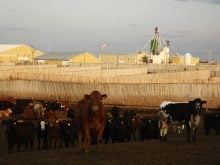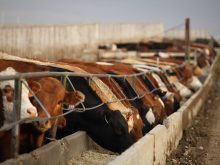It used to be uncommon to hear Canadian cattle industry officials talking like European Union bureaucrats.
But Manitoba Cattle Producers Association policy analyst Shane Sadorski was talking the same language as the Europeans and some Canadian farm groups two weeks ago.
“How do we achieve the most multifunctionality off the land,” asked Sadorski, before describing the MCPA’s scheme for paying farmers for protecting environmentally vulnerable sections of their land.
“We think our model is the simplest, most affordable.”
The MCPA has been promoting its “environmental goods and services” plan since the fall, trying to catch the attention of the public and federal and provincial governments.
Read Also

Canadian-bred cow wins World Dairy Expo Holstein show
A cow bred in Saskatchewan, Lovhill Sidekick Kandy Cane, is the Grand Champion Holstein at the 2025 World Dairy Expo.
The same approach has been promoted for years by Manitoba’s Keystone Agricultural Producers in its Alternative Land Use Services plan, a system that KAP has just finished piloting in one rural municipality and which it hopes governments will eventually embrace.
KAP president Ian Wishart said MCPA’s competing proposal doesn’t undermine ALUS, but helps get the idea onto the government agenda.
“I see them getting behind this approach as supportive,” said Wishart.
“It would be really nice if we could all get on the same page, but at least we’re talking the same language.”
MCPA recently pulled out of KAP, where it was a contributing member, saying KAP didn’t spend enough time on livestock issues. Manitoba’s pig producers have sometimes made the same complaint.
Wishart hopes that if MCPA can’t work within KAP to achieve its goals, at least it can promote similar goals and concerns and help build support for government action.
ALUS isn’t perfect and the RM of Blanchard pilot run revealed some flaws that would be corrected in any wider application of the program, Wishart said.
He’s hoping Manitoba can embrace a province-wide ALUS-type program, because Manitoba farmers have been developing the approach for longer than those of any province.
Prince Edward Island is already implementing a provincial program, so it is possible, Wishart said.
“We’ve been strongly encouraged to pursue this,” said Wishart, saying that a number of provincial departments have been involved in discussing a possible implementation of ALUS.
However, the perennial foe of good ideas may stand in the way.
“Budgets are tight,” said Wishart.















